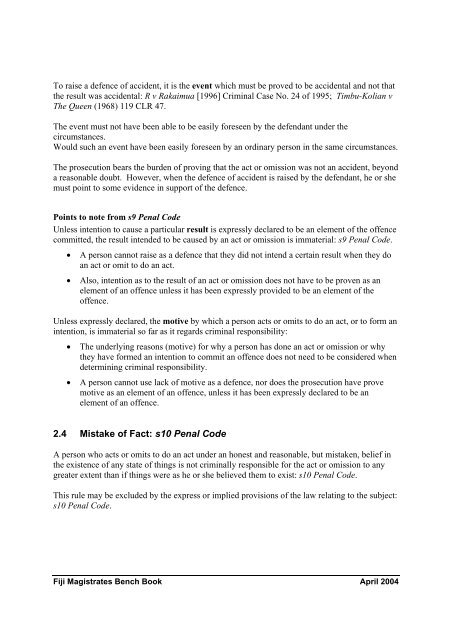Fiji Magistrates Bench Book - Federal Court of Australia
Fiji Magistrates Bench Book - Federal Court of Australia
Fiji Magistrates Bench Book - Federal Court of Australia
You also want an ePaper? Increase the reach of your titles
YUMPU automatically turns print PDFs into web optimized ePapers that Google loves.
To raise a defence <strong>of</strong> accident, it is the event which must be proved to be accidental and not that<br />
the result was accidental: R v Rakaimua [1996] Criminal Case No. 24 <strong>of</strong> 1995; Timbu-Kolian v<br />
The Queen (1968) 119 CLR 47.<br />
The event must not have been able to be easily foreseen by the defendant under the<br />
circumstances.<br />
Would such an event have been easily foreseen by an ordinary person in the same circumstances.<br />
The prosecution bears the burden <strong>of</strong> proving that the act or omission was not an accident, beyond<br />
a reasonable doubt. However, when the defence <strong>of</strong> accident is raised by the defendant, he or she<br />
must point to some evidence in support <strong>of</strong> the defence.<br />
Points to note from s9 Penal Code<br />
Unless intention to cause a particular result is expressly declared to be an element <strong>of</strong> the <strong>of</strong>fence<br />
committed, the result intended to be caused by an act or omission is immaterial: s9 Penal Code.<br />
• A person cannot raise as a defence that they did not intend a certain result when they do<br />
an act or omit to do an act.<br />
• Also, intention as to the result <strong>of</strong> an act or omission does not have to be proven as an<br />
element <strong>of</strong> an <strong>of</strong>fence unless it has been expressly provided to be an element <strong>of</strong> the<br />
<strong>of</strong>fence.<br />
Unless expressly declared, the motive by which a person acts or omits to do an act, or to form an<br />
intention, is immaterial so far as it regards criminal responsibility:<br />
• The underlying reasons (motive) for why a person has done an act or omission or why<br />
they have formed an intention to commit an <strong>of</strong>fence does not need to be considered when<br />
determining criminal responsibility.<br />
• A person cannot use lack <strong>of</strong> motive as a defence, nor does the prosecution have prove<br />
motive as an element <strong>of</strong> an <strong>of</strong>fence, unless it has been expressly declared to be an<br />
element <strong>of</strong> an <strong>of</strong>fence.<br />
2.4 Mistake <strong>of</strong> Fact: s10 Penal Code<br />
A person who acts or omits to do an act under an honest and reasonable, but mistaken, belief in<br />
the existence <strong>of</strong> any state <strong>of</strong> things is not criminally responsible for the act or omission to any<br />
greater extent than if things were as he or she believed them to exist: s10 Penal Code.<br />
This rule may be excluded by the express or implied provisions <strong>of</strong> the law relating to the subject:<br />
s10 Penal Code.<br />
<strong>Fiji</strong> <strong>Magistrates</strong> <strong>Bench</strong> <strong>Book</strong> April 2004
















